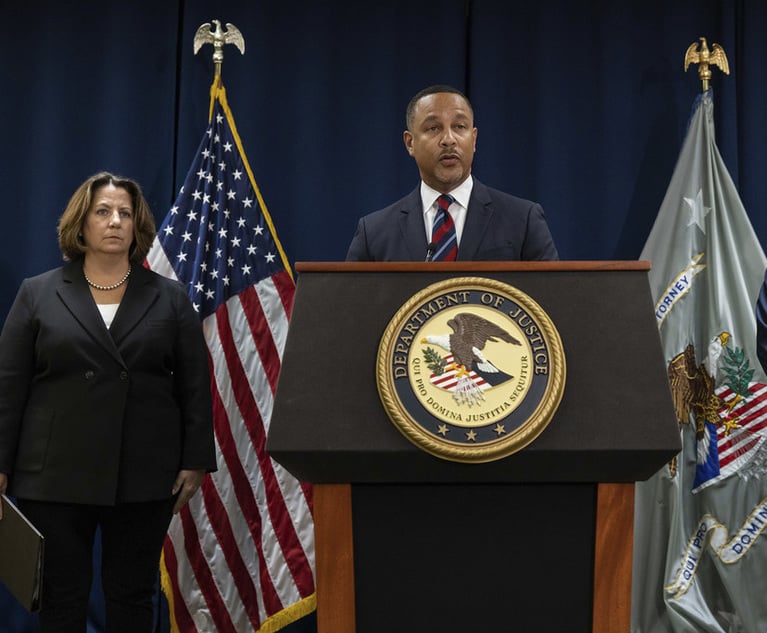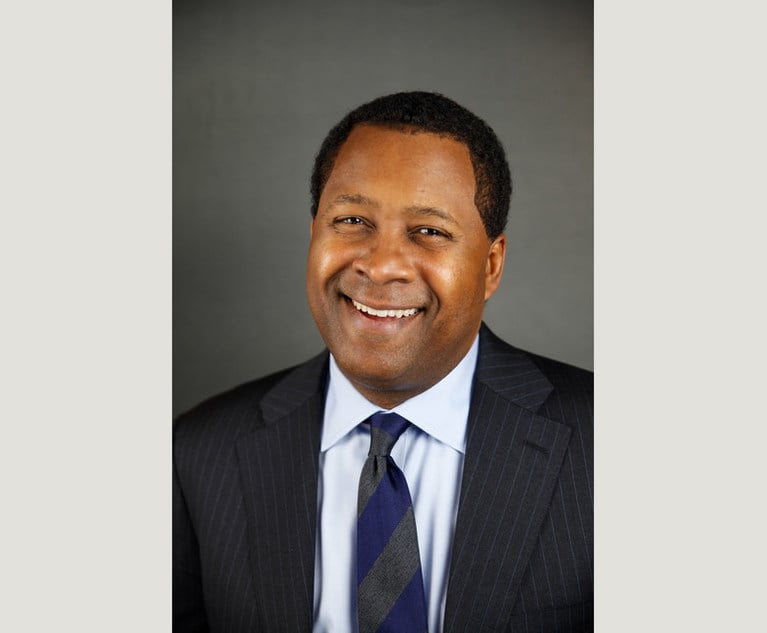Compliance Hot Spots: DOJ's New Guidance on Monitor Evaluation | Lobbying Powerhouses | Lessons from a New DPA | Who Got the Work
The US Justice Department has new -- and lengthy -- guidance about how prosecutors are expected to evaluate compliance programs. Links below. Plus: Wall Street's political spend is rising, and there's a new False Claims Act whistleblower ruling that could soon get more attention. Thanks for reading!
April 30, 2019 at 09:00 PM
7 minute read
Good evening from Washington—and welcome to Compliance Hot Spots, our roundup and analysis of regulatory and enforcement trends. DOJ's Brian Benczkowski is out with new guidance for evaluating compliance programs; Wall Street is spending big-time on politics; lessons from Celadon's DPA; and there's a big new False Claims Act ruling that involves a compliance professional. Tips, feedback and general thoughts on your practices always appreciated. I'm your host, C. Ryan Barber. Reach me at [email protected] and 202-828-0315, or follow me on Twitter @cryanbarber.

DOJ's Benczkowski: Monitors Still Have a Role
Last October, the U.S. Justice Department took what some viewed as a step to curtail corporate settlements that require companies to hire an outside monitor. The department issued guidance urging prosecutors to consider the “projected costs and burdens” of a compliance monitor. It appeared a business-friendly move that would free companies from the pesky, and frequently costly, corporate monitor looking over their shoulder.
But did that guidance, in fact, spell the death of monitorships? Assistant Attorney General Brian Benczkowski, head of the Justice Department's criminal division, thinks not.
“Put simply, this guidance was not meant to do away with monitors—it was meant to focus our prosecutors' determination on the appropriate factors so that monitors are imposed only where necessary and under the terms and scope that is appropriate for that given case,” Benczkowski said in Dallas on Tuesday, pointing to a pair of settlements within the past two months.
Benczkowski specifically noted the Justice Department's settlements in March with Mobile TeleSystems PJSC, a Moscow-based telecommunications company, and the German-based Fresenius Medical Care. In both cases, the Justice Department said the companies had not fully tested their compliance programs, raising doubts about their effectiveness.
As part of his remarks Tuesday, Benczkowski unveiled revised guidance detailing how prosecutors should evaluate compliance programs when determining proper penalties against companies.
“Effective compliance programs play a critical role in preventing misconduct, facilitating investigations, and informing fair resolutions,” Benczkowski said. “Today's guidance document is part of our broader efforts in training, hiring, and enforcement to help promote corporate behaviors that benefit the American public and ensure that prosecutors evaluate the effectiveness of compliance in a rigorous and transparent manner.”

Compliance Headlines: What Caught My Eye
>> As Bank Profits Soar, Wall Street's Political Spending Hits New High. “Wall Street banks and other parts of the financial sector spent close to $2 billion on lobbying and campaign contributions in the 2018 election cycle, a 36 percent jump from the last non-presidential campaign year, according to a new report released Tuesday.” [The Washington Post] The left-leaning Americans for Financial Reform's report is here.
>> DOJ Lawyer Stands Up Dems—and Puts Obscure House Rule in Spotlight. The U.S. Justice Department's refusal to allow top-ranking lawyer John Gore to sit for renewed questioning highlights an arcane U.S. House rule that has featured prominently in the Trump administration's clash with Congress: the prohibition on administration lawyers sitting in on depositions of government officials. [Law.com]
>> Lessons From Celadon's DPA: Follow Compliance Road Map. “DOJ continues its emphasis on holding individuals responsible,” said Julie Myers Wood, CEO of compliance consultant Guidepost Solutions. “Making personnel changes to address wrongdoing is often a key component before DOJ will even consider a [deal]. If you are senior leadership, it is likely that you will be terminated.” Goodwin Procter LLP partners Lloyd Winawer and Derek Cohen represented Celadon Group Inc. [Law.com]
>> Musk, SEC Reach Deal to End Court Fight Over Tesla CEO's Tweets. “Mr. Musk and the SEC on Friday agreed to modify the original order by clarifying a list of events or financial milestones that Mr. Musk couldn't communicate without preapproval, according to a filing in Manhattan federal court.” [Wall Street Journal]
>> Skadden's Foreign-Lobbying Settlement Is Off-Limits at Greg Craig's Trial. Federal prosecutors have agreed not to offer as evidence at Greg Craig's trial the settlement his former law firm, Skadden, Arps, Slate, Meagher & Flom, reached in January to resolve claims that it failed to disclose past work for the Russia-aligned government of Ukraine. [Law.com] Meanwhile: Craig's lawyers at Zuckerman Spaeder offered their first glimpse Tuesday at their defenses—they called the charges “vague, cryptic and confusing.”

Who Got the Work
>> Akin Gump Strauss Hauer & Feld, reporting $9.6 million in Q1 lobbying revenue, topped Brownstein Hyatt Farber Schreck, which reported $9.2 million, Politico reported. And here are the biggest contracts, according to the report: Covington & Burling: Qualcomm ($1.4 million), a longtime client of the firm's; Squire Patton Boggs: Port Link GP ($1.1 million); and Hogan Lovells: ZTE ($890,000), the Chinese telecom that has faced U.S. sanctions pressures. Meanwhile, Brownstein Hyatt is lobbying for Purdue on behalf of Wilmer Cutler Pickering Hale and Dorr, according to a new registration.
>> Gibson, Dunn & Crutcher, including partner Robert Blume in Denver, represented Keypoint Government Solutions LLC in a False Claims Act whistleblower case in the U.S. Court of Appeals for the Tenth Circuit. The court on Tuesday upheld the dismissal of a retaliation claim brought by a senior quality control analyst, Julie Reed, who was represented by Richard Condit of Mehri & Skalet. But the court revived qui tam claims. “We disagree with the [trial] court's conclusion that Ms. Reed's allegations do not materially add to the public disclosures, such that she did not qualify as an original source,” the appeals panel said. Read the opinion here.
>> A team from Kirkland & Ellis—including Paul Clement and Erin Murphy—represent a former hedge fund trader named Matthew Martoma, who is fighting in the U.S. Supreme Court to overturn his insider-trading conviction. The question Clement posed: “Whether, in an insider trading prosecution, the government must demonstrate that the tipper received a personal benefit in exchange for providing insider information, as required by Dirks, or whether it suffices for the government to show that the tipper intended to confer a benefit on the tippee.” The Justice Department has urged the Supreme Court to turn down Martoma's petition.

Notable Moves & Announcements
• Kerri Ruttenberg (above), head the Jones Day litigation team in Washington, is joining Walmart Inc. as its new senior vice president of litigation. Ruttenberg, who will join the retailer July 1, succeeds Mike Bennett, who retired last year.
• Katherine Lemire was appointed as executive deputy superintendent of the New York Department of Financial Services's new Consumer Protection and Financial Enforcement Division. Lemire earlier was a partner at StoneTurn, the international consulting firm providing compliance and investigative services.
• Veteran in-house counsel and compliance whisperer Andre Burrell has joined Sumitomo Mitsui Banking Corp. in its effort to bring its New York branch into compliance with requirements demanded last week by the U.S. Federal Reserve Board and the Federal Reserve Bank of New York, my colleague Sue Reisinger reports. Burrell will serve as managing director and Bank Secrecy Act/anti-money laundering officer for Sumitomo's Americas division.
• Jesse Panuccio, formerly acting associate U.S. attorney general, has left the U.S. Justice Department. Our recent scoop said U.S. Attorney General William Barr is looking to elevate Claire Murray. Panuccio, a former partner at Foley & Lardnerin Miami, previously a lawyer for Sen. Ted Cruz's presidential campaign. My colleague Ryan Lovelace has more on Panuccio's next steps here at Law.com.
• Paul Pearlman, who has led Kramer Levin Naftalis & Frankel since 2000 as managing partner, will retire at the end of this year. Partners Paul Schoeman and Howard Spilko are set to take his place. Schoeman practices white-collar criminal defense, and Spilko advises private equity firms, hedge funds and other clients on mergers, acquisitions and other transactions.
• Ice Miller LLP has hired partner Timothy Belevetz in the firm's white-collar criminal defense and investigations practice in Washington. Belevetz formerly was a federal prosecutor in Virginia and worked at Holland & Knight.
This content has been archived. It is available through our partners, LexisNexis® and Bloomberg Law.
To view this content, please continue to their sites.
Not a Lexis Subscriber?
Subscribe Now
Not a Bloomberg Law Subscriber?
Subscribe Now
NOT FOR REPRINT
© 2025 ALM Global, LLC, All Rights Reserved. Request academic re-use from www.copyright.com. All other uses, submit a request to [email protected]. For more information visit Asset & Logo Licensing.
You Might Like
View All
Compliance Hot Spots: GOP Eyes ESG as an Antitrust Issue + Another DOJ Crypto Seizure + Sidley Partner Jumps to Main Justice
9 minute read
Compliance Hot Spots: Lessons from Lafarge + Fraud Section Chief Talks Compliance + Cravath Lands FTC Commissioner
11 minute readTrending Stories
- 1States Accuse Trump of Thwarting Court's Funding Restoration Order
- 2Microsoft Becomes Latest Tech Company to Face Claims of Stealing Marketing Commissions From Influencers
- 3Coral Gables Attorney Busted for Stalking Lawyer
- 4Trump's DOJ Delays Releasing Jan. 6 FBI Agents List Under Consent Order
- 5Securities Report Says That 2024 Settlements Passed a Total of $5.2B
Who Got The Work
J. Brugh Lower of Gibbons has entered an appearance for industrial equipment supplier Devco Corporation in a pending trademark infringement lawsuit. The suit, accusing the defendant of selling knock-off Graco products, was filed Dec. 18 in New Jersey District Court by Rivkin Radler on behalf of Graco Inc. and Graco Minnesota. The case, assigned to U.S. District Judge Zahid N. Quraishi, is 3:24-cv-11294, Graco Inc. et al v. Devco Corporation.
Who Got The Work
Rebecca Maller-Stein and Kent A. Yalowitz of Arnold & Porter Kaye Scholer have entered their appearances for Hanaco Venture Capital and its executives, Lior Prosor and David Frankel, in a pending securities lawsuit. The action, filed on Dec. 24 in New York Southern District Court by Zell, Aron & Co. on behalf of Goldeneye Advisors, accuses the defendants of negligently and fraudulently managing the plaintiff's $1 million investment. The case, assigned to U.S. District Judge Vernon S. Broderick, is 1:24-cv-09918, Goldeneye Advisors, LLC v. Hanaco Venture Capital, Ltd. et al.
Who Got The Work
Attorneys from A&O Shearman has stepped in as defense counsel for Toronto-Dominion Bank and other defendants in a pending securities class action. The suit, filed Dec. 11 in New York Southern District Court by Bleichmar Fonti & Auld, accuses the defendants of concealing the bank's 'pervasive' deficiencies in regards to its compliance with the Bank Secrecy Act and the quality of its anti-money laundering controls. The case, assigned to U.S. District Judge Arun Subramanian, is 1:24-cv-09445, Gonzalez v. The Toronto-Dominion Bank et al.
Who Got The Work
Crown Castle International, a Pennsylvania company providing shared communications infrastructure, has turned to Luke D. Wolf of Gordon Rees Scully Mansukhani to fend off a pending breach-of-contract lawsuit. The court action, filed Nov. 25 in Michigan Eastern District Court by Hooper Hathaway PC on behalf of The Town Residences LLC, accuses Crown Castle of failing to transfer approximately $30,000 in utility payments from T-Mobile in breach of a roof-top lease and assignment agreement. The case, assigned to U.S. District Judge Susan K. Declercq, is 2:24-cv-13131, The Town Residences LLC v. T-Mobile US, Inc. et al.
Who Got The Work
Wilfred P. Coronato and Daniel M. Schwartz of McCarter & English have stepped in as defense counsel to Electrolux Home Products Inc. in a pending product liability lawsuit. The court action, filed Nov. 26 in New York Eastern District Court by Poulos Lopiccolo PC and Nagel Rice LLP on behalf of David Stern, alleges that the defendant's refrigerators’ drawers and shelving repeatedly break and fall apart within months after purchase. The case, assigned to U.S. District Judge Joan M. Azrack, is 2:24-cv-08204, Stern v. Electrolux Home Products, Inc.
Featured Firms
Law Offices of Gary Martin Hays & Associates, P.C.
(470) 294-1674
Law Offices of Mark E. Salomone
(857) 444-6468
Smith & Hassler
(713) 739-1250










